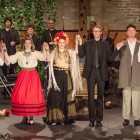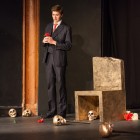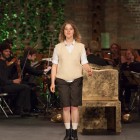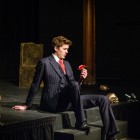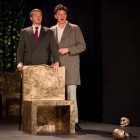Alcina 2016Ryedale Festival Opera
Read more about the opera Alcina
With Scottish Opera's spring staging of Ariodante such a happy recent memory, it was remarkably good timing of the Perth management to bring its companion piece, Alcina. Also derived from the writings of Ariosto, who died five hundred years ago, its plot is very much more extravagant. The central character is a sorceress who uses her magic powers to ensnare her lovers before transforming them into the various kinds of wildlife with which her island is populated. Musically, it is as good, perhaps even better, than Ariodante.
The Ryedale Festival staging of Poppea came to the Lammermuir Festival and Perth Concert Hall two years back, and was a superbly memorable performance. It can be said straight away that this was every bit as good. It will have left the audience, who were completely gripped throughout, waiting eagerly for a third offering of this quality. This staging was tactfully adjusted to play comfortably in two acts instead of the original three - there were a few cuts, but everything was coherent.
Comment should perhaps start with the excellent little band. Billed as the Experience Ensemble, they are, ostensibly, trainees working with the Orchestra of the Age of Enlightenment, to learn the ideals of baroque performance practice. They have clearly studied well, and the small group - string quintet, two oboes (doubling recorders) and bassoon, with Ian Tindale directing from the harpsichord - produced consistently mellifluous sounds, with many lovely solo contributions beautifully judged to complement the singing.
The stage direction of Nina Brazier, as with Poppea, placed an emphasis on the subtlety of the performance. A quartet of singers provided the few chorus sequences and also hinted at the kind of movement that Marie Sallé's dance troupe, over from Paris, may have lent the original. The band was placed centre stage, with the basic backdrop of a horticultural nature behind them. The few additional props were mainly seats, with just a few skulls tastefully scattered about. The simple lighting plot provided plenty of subtle effects.
Considering the fact that most of the principals are still studying at our music colleges, the standard of singing and acting was of astonishing quality. The two leading soprano roles, the sisters Alcina and Morgana, both have wonderful laments to perform, as well as livelier sequences. Cherise Lagasse, in the title role, and Robyn Allegra Parton as her sister, both achieved superb feats of concentration in these pieces. They also attained a great impact with the fiery singing of their faster numbers. Morgana's 'Tornami a vagheggiar' with oboe obbligato at the end of the first act deservedly brought the first audience applause, and Alcina's majestic 'Ombre pallide' also stood out. They were costumed in a vaguely hispanic gipsy style, which worked well, while the other characters were in sober suits. Their communication of John Warrack's translation was, in common with the other singers, superbly clear.
The leading male character, Ruggiero, is sung at alto pitch, and until recently was generally sung by a female. Timothy Morgan showed himself to be an excellent addition to the new generation of counter-tenors, with a beautiful rendering of 'Verdi prati'. If he doesn't yet quite produce the sheer power for his bravura number, 'Sta nell' ircana', he had the sense not to force his tone, and his voice still projected well. Maria Ostroukhova, well-remembered as the excellent Ottavia in Poppea, has the lovely contralto tones for Bradamante's music, which contrasted well with her colleagues.
Joel Williams made a vocally impressive Oronte - tenors in the baroque era were generally allotted less dominant characters in the drama - and he showed how effective a singer can be who clearly listens and reacts to his colleagues. Jerome Knox as the tutor and Sophie Gallagher as the boy Oberto, desperately seeking his father, one of Alcina's earlier victims, also made an impact in their shorter solos.

